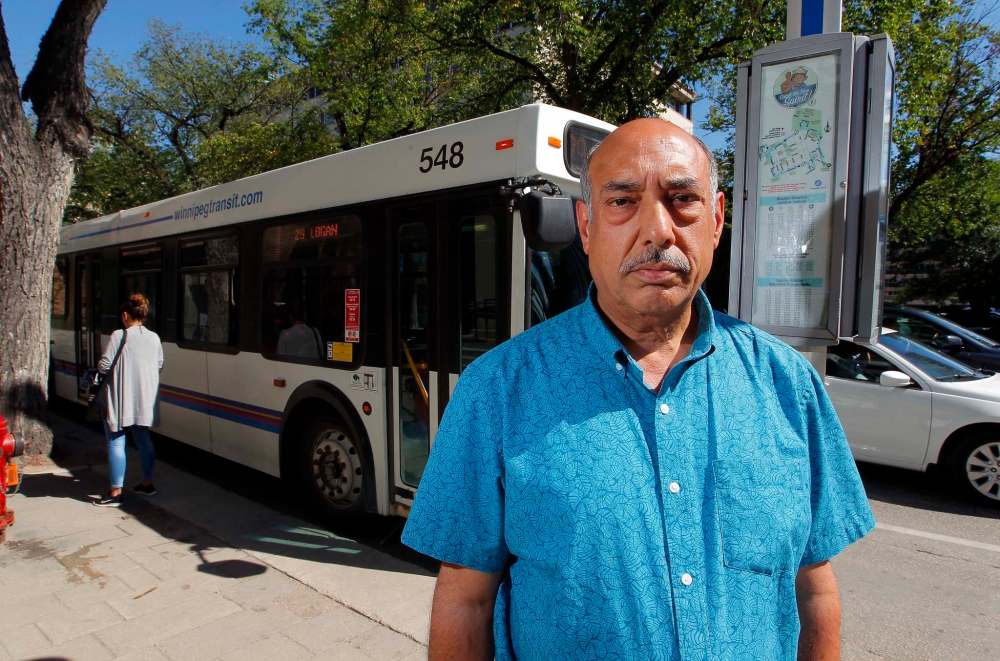Transit union boss says city uninterested in grants for electric buses
Advertisement
Read this article for free:
or
Already have an account? Log in here »
To continue reading, please subscribe:
Monthly Digital Subscription
$0 for the first 4 weeks*
- Enjoy unlimited reading on winnipegfreepress.com
- Read the E-Edition, our digital replica newspaper
- Access News Break, our award-winning app
- Play interactive puzzles
*No charge for 4 weeks then price increases to the regular rate of $19.00 plus GST every four weeks. Offer available to new and qualified returning subscribers only. Cancel any time.
Monthly Digital Subscription
$4.75/week*
- Enjoy unlimited reading on winnipegfreepress.com
- Read the E-Edition, our digital replica newspaper
- Access News Break, our award-winning app
- Play interactive puzzles
*Billed as $19 plus GST every four weeks. Cancel any time.
To continue reading, please subscribe:
Add Free Press access to your Brandon Sun subscription for only an additional
$1 for the first 4 weeks*
*Your next subscription payment will increase by $1.00 and you will be charged $16.99 plus GST for four weeks. After four weeks, your payment will increase to $23.99 plus GST every four weeks.
Read unlimited articles for free today:
or
Already have an account? Log in here »
Hey there, time traveller!
This article was published 03/05/2018 (2771 days ago), so information in it may no longer be current.
The union that represents Winnipeg Transit staff says city hall is missing out on an opportunity to access loans and grants to electrify the transit fleet.
Aleem Chaudhary, president of Amalgamated Transit Union Local 1505, said the Federation of Canadian Municipalities is providing low-interest loans and grants for “green” projects, including electrification of transit fleets but the City of Winnipeg doesn’t seem interested.
“City hall could easily finance the addition of at least 20 electric buses, but for some reason they just don’t seem interested in going this route,” Chaudhary said, adding the reduced maintenance costs of electric buses should make them attractive to Winnipeg Transit.

The FCM has a low-interest loan program for green projects, including the electrification of transit buses. The loans, up to a maximum of $10 million, are provided for 80 per cent of project costs. In addition, the FCM can provide a grant of 15 per cent of the loan, up to $1.5 million, for the same project.
The FCM deadline for applications this year is Aug. 1.
Winnipeg Transit has been operating four electric buses since 2014 on a pilot basis. A recent provincial-city task force report which examined that initiative recommended Winnipeg purchase another 12 to 20 electric buses to determine the impact on a wider basis.
While the province said it’s interested in considering expanding Winnipeg’s fleet with electric buses, city hall has no plan to go that route.
Transit has 630 buses in its fleet and council has approved a plan to purchase 40 replacement diesel buses in 2018 and another 42 buses in 2019.
However, the public works committee this week directed Transit to develop a plan on how to convert its existing fleet to electric, including all related costs and how it might be financed. That report is due in 120 days.
The ATU last month proposed the province provide the city with a $7-million, no-interest loan to bridge the higher cost of purchasing 20 electric buses rather than diesel, using the annual operating savings to repay the loan.
The ATU said a study by the University of Manitoba revealed the annual operating costs of electric buses is about $62,000 less than that of diesel, but the purchase price is substantially higher — $850,000 versus $500,000.
Purchasing 20 diesel buses would cost about $10 million, while the price tag for 20 electric buses is about $17 million.
Chaudhary said the report from Transit won’t be done in time for the FCM Aug. 1 deadline.
The union leader said he only recently learned of the FCM loan program, adding if the province is unwilling or financially unable to provide city hall with the funds, the city should turn to the FCM.
“There’s an opportunity for a great savings through the FCM program, but if the city misses out on the application deadline, that opportunity will be lost,” Chaudhary said.
“A loan from the FCM could be easily repaid from the annual operating savings. We just don’t see why the city is not moving in that direction.”
Chaudhary said the union contacted Mayor Brian Bowman and Coun. Marty Morantz (then-chairman of the public works committee) two weeks ago about approaching the province to arrange purchasing the electric buses, but it has not yet received a response.
aldo.santin@freepress.mb.ca

